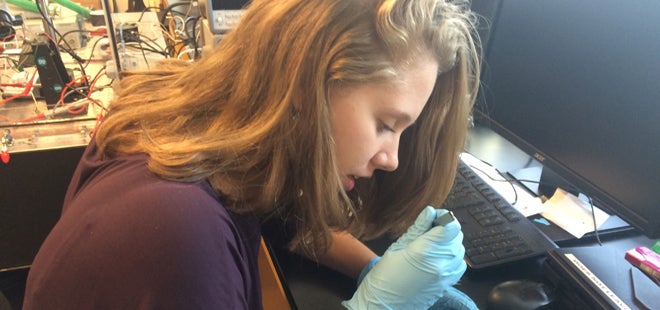Program Details
About the Program
Materials science is the enabling technology behind everything from modern electronics to fashion, safe and recyclable packaging, faster and fuel-efficient vehicles, novel energy generation and storage, aerospace propulsion systems, affordable housing, medical engineering, sensors, nanotechnology, and micromachines. One of the most exciting directions in science and policy-making is sustainability, with its emphasis on energy conservation, storage, and renewable production.
The objective of this Research Experience for Undergraduates (REU) program at Boise State University is to provide an intensive research-team experience with state-of-the-art facilities while exploring activities within the theme materials for society. Mentors from various disciplines work with students to develop skills needed to excel in academic and industrial research environments, where interdisciplinary teams are standard. Students ultimately present their results at the annual summer research conference.
Cost for Students to Participate
There is no cost to REU Program participants! Students selected to participate in the REU receive a $600-$700 stipend per week. Housing and a meal plan is provided on the Boise State campus. A limited number of travel allowances are also available for out-of-state participants.
Travel allowances are not available to students who live within a 100 mile radius of Boise State University. Local students are welcome to stay in on-campus housing for the duration of the REU.
Program Research Projects
Projects generally fall into one or more of four broad categories:
- Energy generation (e.g., solar cells, magnetic shape-memory alloys, thermoelectrics)
- Energy storage (e.g., sodium-ion batteries, building systems)
- Energy conservation (e.g., carbon nanoelectronics)
- Societal challenges associated with materials processing/modeling/characterization (e.g., carbon nanoelectronics, empirical modeling)
These research and educational activities are supported by the National Science Foundation, Office of Special Programs, Division of Materials Research.
Program Eligibility
In order to participate (and receive payments/reimbursements), students must meet the following requirements:
- Current U.S. citizenship, U.S. national, or U.S. permanent residency
- Current enrollment in a degree program (part-time or full-time) leading to a baccalaureate or associate degree
- High-school graduates who have been accepted at an undergraduate institution* but who have not yet started their undergraduate study are also eligible to participate
- Students who have received their bachelor’s degrees and are no longer enrolled as undergraduates are generally not eligible to participate
- Availability for full-time research work Monday–Friday, 9:00am-5:00pm from 16 May – 19 July 2024
Non-US citizens/nationals/residents may participate but cannot be financially supported by the program in any way and so must also demonstrate that they have the means to support themselves during the summer.
* accredited colleges and universities (including two-year community colleges) that award Associate’s degrees, Bachelor’s degrees, and/or Master’s degrees in NSF-supported fields, but have awarded 20 or fewer Ph.D./D.Sci. degrees in all NSF-supported fields during the combined previous two academic years.
Statement on Underrepresented Groups
The REU projects described here offer an opportunity to tap the nation’s diverse student talent pool and broaden participation in science and engineering. Toward that end, we particularly encourage women, persons with disabilities, veterans, and students from groups traditionally underrepresented in science and engineering (including African Americans, Hispanics, American Indians, Alaska Natives, and Native Hawaiians or Other Pacific Islanders) to apply.
How to Apply
Complete the Online Application
The online application requests the following information (you might assemble it prior to starting the application form):
- Contact information
- Academic information including colleges or universities attended, major, year in school, expected graduation date
- An electronic copy of college transcripts (unofficial is suitable) that includes course grades and current classes for which you are registered
- Education and career plans
- Demographic and background information, including citizenship status, race/ethnicity, military experience, and parent/guardian education information
- Two short essays (each no more than 300 words) that describe the following:
- Why you want to participate and what you expect to get out of the program
- Prior relevant experience (research, laboratory classes, etc.)
Request Two Letters of Reference from Academic Faculty
We will not contact references directly, so applicants must contact their referees to request letters themselves. Letters received by the priority deadline of 9 February 2024 will be given priority consideration. Remember to follow up with your referees to ensure that their letters have been submitted.
- At least one of the referees must be able to comment on your potential for independent research. Both should comment on your laboratory skills, your interest in science, motivation, work ethic, etc.
- Request that the referees submit their letters online on the REU Reference Letters webpage
- Request that the letters be submitted by 9 February 2024 if possible.
QUESTIONS?
Please contact us at materials@boisestate.edu or call Prof. Rick Ubic at (208) 426-2309.
